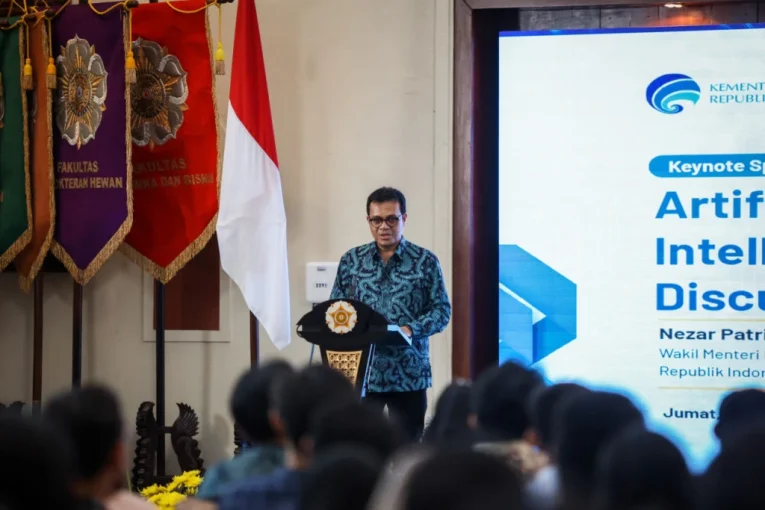
Indonesia’s digital economy, projected to reach 366 billion US dollars by 2030, is expected to grow exponentially. This growth hinges significantly on the strategic utilization of artificial intelligence (AI) technology across industries.
However, to ensure that AI benefits society without causing harm, more robust regulatory frameworks governing its ethical and responsible use are urgently needed.
This topic took center stage at a public discussion, “The Need to Develop Artificial Intelligence Governance Regulations,” hosted at the UGM Senate Hall on Friday (Mar. 8).
Organized by the UGM Faculty of Philosophy in collaboration with the Ministry of Communication and Information Technology and ELSAM, the discussion featured esteemed speakers, including Vice Minister of Communication and Information Technology Nezar Patria, Dean of the UGM Faculty of Philosophy Dr. Siti Murtiningsih, Director of Government Relations at Microsoft Indonesia and Brunei Darussalam, Ajar Edi, Executive Director of ELSAM Wahyudi Djafar, and Head of the Master’s in Artificial Intelligence Program at the UGM Faculty of Mathematics and Natural Sciences, Dr. Afiahayati.
According to various studies, Vice Minister Nezar Patria highlighted that while the digital economy’s contribution to GDP is less than 10 percent, Indonesia’s digital economic landscape is poised for exponential growth, potentially reaching 366 billion US dollars by 2030.
“In comparison to other Southeast Asian nations where growth could exceed 1 trillion dollars, the digital economy’s contribution could be close to 40 percent,” he remarked.
This rise is tied to the widespread adoption of AI technology across industries. Consequently, the ministry issued ethical AI usage guidelines in December 2023 targeting AI developers and industry players.
“These guidelines are instrumental in addressing ethical considerations as AI’s impacts extend across social, economic, and cultural realms,” the vice minister added.
However, he underscored that these guidelines lack legal enforceability as they are not yet incorporated into legislation. The government is closely monitoring AI’s evolution in Indonesia’s industrial landscape.
“We are currently operating under soft regulation by closely observing AI’s evolution in the industry, aiming to harness its benefits while mitigating potential risks,” he elucidated.
Nezar Patria identified several risks associated with AI usage, including the potential for misuse leading to social discrimination and the proliferation of disinformation, which could adversely impact social cohesion.
In addition to establishing ethical guidelines, the Ministry of Communication and Information Technology is actively promoting digital talent development to bolster the digital economy over the next five to six years.
“We require 9 million digital talents,” he emphasized.
Dr. Siti Murtiningsih of UGM emphasized that in this era of rapid technological advancement, the ethical implications of AI technology cannot be overlooked. Its development must align with societal values and ethics, ensuring it does not contradict humanitarian principles.
She stressed the imperative of enacting more stringent legal frameworks encompassing AI ethics principles from a multidisciplinary standpoint to safeguard societal and industrial interests related to AI adoption.
“We need to formulate laws addressing AI ethics principles from a multidisciplinary viewpoint,” she asserted.
On a different note, Ajar Edi shed light on misconceptions surrounding AI among the general populace. However, for executives and employees in organizations, AI can enhance productivity and efficiency.
“Despite potential biases, humans remain the most suitable decision-makers to ensure sound decision-making,” he concluded.
Author: Gusti Grehenson
Photographer: Donnie
